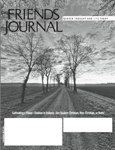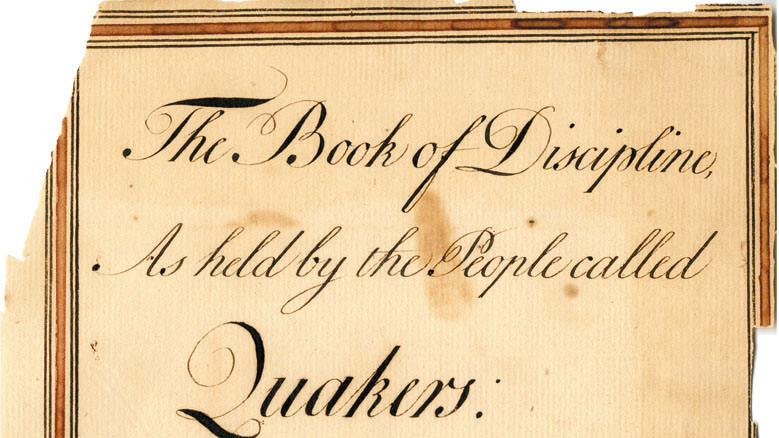To someone who is not familiar with the controversy in Indiana Yearly Meeting, what would be your synopsis of the decision some meetings have made to split off and form their own governing body?
The Indiana Yearly Meeting split was based on differing views of yearly meeting authority and theology. There is a pretty clear difference in the yearly meeting between those Friends who draw strongly on the Orthodox tradition of Quakerism—that the yearly meeting should be a final sovereign authority with the power to direct and discipline subordinate meetings—and a minority, of which I am a part, who don’t agree. We decided that the time had come to undertake an intentional and amicable separation.
When did these differing views about the role of the yearly meeting start to arise?
Questions have been coming up for over a century: issues ranging from outward sacraments, a lot of things connected with Earlham College, evolution, to critical study of the Bible. Most recently (for about two to three decades), the most divisive issues have centered on sexuality and same-sex relationships. In 1982, IYM approved a minute that said that same-sex relationships are contrary to the will of God. It was controversial at the time and has become more controversial over the past couple of decades. The most recent controversy came to a head a few years ago, when West Richmond (Ind.) Meeting (which includes many Earlham faculty and alumni) united on what has become known as “The Welcoming Minute.” It said West Richmond Meeting would affirm and recognize same sex couples in committed relationships just as it would affirm and recognize heterosexual couples.
However, this was very carefully qualified. For example, West Richmond said Indiana state law being what it was was, and IYM being what it was, the meeting would not conduct a same-sex marriage. They would not ask IYM to change its position on same-sex relationships because the discussion would be divisive. The discussion got more intense because there were many Friends in IYM who could not accept being part of an organization that had even one congregation that did not regard homosexuality as sinful. There are Friends who felt that unless they opposed this affirmation of same sex relationships with every fiber of their being, God would hold them accountable, and they were threatening their own salvation.
The yearly meeting had the matter under care for a number of years, and it became clear that West Richmond would not change its position. The meeting members felt they could not do so and maintain their integrity. Most of IYM could not accept this, and there were fears that this would lead to a separation. Some monthly meetings planned to leave unless the yearly meeting took strong action.
When did you become part of the task force to work on this matter?
In spring 2011, the yearly meeting clerk asked six other Friends (myself included) to join him on a task force to look at this whole question. Five of the members, including the clerk and yearly meeting superintendent, were generally supportive of the yearly meeting position; to some degree or another, they were opposed to the West Richmond minute. Stephanie Crumley Effinger from Earlham School of Religion (a member of West Richmond Meeting) and I were the only ones on the task force that were perceived as being sympathetic to West Richmond. The number of us on the task force that supported West Richmond reflected the small proportion of supporters in the entire yearly meeting, which was made up of 64 monthly meetings. (Two monthly meetings have since indicated that they wanted to leave Indiana Yearly Meeting before we finished this process. They are strongly evangelical churches and thought that toleration of West Richmond had just gone on too long.)
On the task force, we discussed alternatives to splitting: whether it would be best for West Richmond to just withdraw from the yearly meeting, or if we could come up with a “live and let live” policy and recognize that the yearly meeting was diverse. However, there was nothing that the task force could unite on and still respect the consciences of all Friends. In the July sessions of last year, there was a proposal that the yearly meeting should pursue a policy of reconfiguration to deal with the different perceptions of yearly meeting authority.
Since you’re a historian who has studied Quaker schisms, did you base some of your decisions on how meetings handled these kinds of splits in the past?
In the past, yearly meetings split because the old yearly meetings were large enough to justify setting off new yearly meetings. Then there were the separations based on authority and theology. I can’t imagine how hard it was in Philadelphia in 1827 with the Hicksite and Orthodox split, or in Ohio in 1828, when they had a riot in the meetinghouse and someone broke one of the clerk’s ribs.
Only one other case was intentional like ours: In the 1950s, Nebraska set off Rocky Mountain Yearly Meeting because there was a sort of fundamentalist vs. moderate liberal difference in the yearly meeting. The flashpoints were that Nebraska was part of the Five Years Meeting (later FUM) and had joined the National Council of Churches. Some Friends in Nebraska and Colorado thought that was dangerously liberal. In Indiana, our task force tried to figure out how to purposely divide a yearly meeting, for which there is very little precedent.
Even though the members involved in this split have tried to be amicable toward each other, it is painful for a number of Friends. They hate the idea that they’re leaving a yearly meeting of which they’ve been a part for years and have given their time and energy. There is a perception of a few Friends that they’re being cast out as undesirable. But most Friends have come to the conclusion that we can’t continue as we have. The stresses have just become too great, and refusing to recognize that would be destructive as well. That would more likely lead to an unfriendly division of some kind.
Generally, what would you say is the role of a yearly meeting opposed to a monthly meeting? Did this help inform the decision of how monthly meetings would split off and reconfigure?
If I were to make a broad generalization, the more evangelical Friends are, the more willing they are to give authority to their yearly meetings. For them, doctrinal standards are important, right belief is important, and it’s the duty of a higher authority to guide, direct and, when necessary, discipline subordinates. That’s why the yearly meetings are formed: to watch over each other, and if a meeting goes astray, let them know and bring them back into line. Liberal Friends are not as interested in that doctrinal uniformity. They resist authority. For Liberal Friends, a yearly meeting is a group of monthly meetings that join together to take on tasks that are bigger than what a monthly meeting could be expected to do by itself.
Friends leaving IYM are in the middle: we want to be diverse and welcoming. We are not interested in an elaborate doctrinal statement. Nearly all are pretty clear that we are Christian Friends—being followers of Christ is important to us.
On November 10, the yearly meeting, through its representative council, approved going forward with a plan that we thought would show the best stewardship of resources: let the yearly meeting go on existing as a legal entity and just set off a new yearly meeting or equivalent association.
How many meetings are part of the reconfiguration?
Right now, the reconfiguration consists of about 15 meetings that make up 25-30 percent of IYM membership. These meetings indicated that they are not going to stay in the yearly meeting. Some are small and some are relatively large; some are interested in forming a new entity. One, Spiceland Monthly Meeting, will become an independent meeting for the near future. A number of monthly meetings are in a process of discernment. They’re clear that they don’t belong to the yearly meeting as it envisions itself, and they’re thinking about independence or joining this new association of friends.
What is the name of this new association, and how did that come about?
We’re calling it Yearly Meeting O. When the Reconfiguration Task Force was trying to envision a yearly meeting A and a yearly meeting B (those were the most neutral labels that came to mind for two entities), someone noticed those were two blood types. The universal blood type was O, and the new association wanted universal donors, so we came up with O.
How do you see this schism in IYM relating to the broader cultural concerns of our modern day?
Many people tease me about being a historian helping to make history. I often say the script doesn’t change, just the actors. We’ve had the same arguments for over a century. Many people thought that if we waited a few more years or another decade, Friends would stop worrying about homosexuality and their views would change. That may be, but I haven’t seen it happen over the past 30 years. In the culture, there is no question that societal attitudes are changing, but not so much in rural Indiana.
Much of your professional life is studying the history of past Quaker conflicts. What is it like to be in the thick of it yourself? Has this experience given you a different perspective?
It was interesting to see Friends who had not been particularly active in yearly meeting emerge as leaders in this process. Very often, though, I have found myself arguing with people I generally agreed with. I was sometimes really at odds with them about the advisability of what the task force was doing. I also found myself with growing respect for people I had often disagreed with in the past. I think the overall conclusion I took away was that for me to follow the will of God, it often means transcending the usual lines of division within Quakerism, such as liberal vs. evangelical.
Has this changed people’s perception of what it means to be a Quaker?
I don’t think it has changed anyone’s self-perception, but I think it has driven home how different the perceptions of Friends are. There were Friends in IYM who were astonished that there were any Quakers in Indiana who didn’t take the Bible literally. It was disconcerting to have that driven home to them.





I was raised in the extremely conservative South. But I spent 30+ years in New Jersey and the Philadelphia area (where i became a convinced Quaker) before moving back to Georgia in 2004. I have struggled with extreme conservatism here. But the South is a culture of extremes — extreme religion, extreme politics, etc. Oddly, because of it, I have been driven ever more liberal. That being said, I also have understood for the first time the real meaning of our value to “see that of God in everyone.” Doing so is easy when we are around people we like and enjoy. It’s quite difficult around people who are insulting, abrasive or just plain contrary. And while I ache for the homosexual community (having a dear friend or two who happen to be gay), I also struggle with my attitude towards those who are also my friends, but who truly believe that homosexuality is a choice,not a condition of birth. I hold the Indiana Yearly Meeting in the Light, and hope that we can all come to a consensus about this hurtful issue sometime in this century. My friends who are gay are so creative, brilliant, caring and generous. I personally believe that truth didn’t stop 2,000 years ago or so when the Bible texts were written. Quakers really are seekers of truth, and truth continues to unfold. We didn’t (or shouldn’t have) shut down our brains and creative processes when the Bible was written, otherwise we would still believe in slavery, bigamy, etc. From my friends who are gay, I know they never chose to be. One of them said to me, “Why would I choose to hurt my family or live underground, never acknowledging who I really am? My professional life is carefully plotted.”
That’s just so sad. I choose to accept others as they are, even if they believe differently from me. And that’s hard when they reject as acceptable my wonderful friends (who happen to be gay).
Charlotte Friends Meeting (Liberal unprogrammed) struggled for years with NCYM (FUM) who is adamantantly opposed to same sex marriages and would not agree to bring the issue up in any meeting. Kicking the can down the road never works. The situation came to a head when FGC LGBTQ wanted to meet at Quaker Lake and were denied at the last minute. This coupled with our Meeting’s minute embracing same sex marriage led to our leaving the YM. There was some division in our own meeting. Some wanted to remain in the YM and work from within while others opposed leaving altogether. The vast majority of CFMs never felt in unity with NCYM (FUM) and for us it was an honest solution to the problem. Today we are joining with other meetings to create a new yearly meeting in NC. I applaud IYM for trying to maintain unity, but the fact that many IYM members are shocked that there are Quakers who do not take the Bible literally tells me that they lack any knowledge of the many divisions among Quakers in America. Quakers have a rich history, and it is important for all members and attenders to be aware of Quaker practice from the beginning. IYM practices rose out of the many schisms in our history. It is a shame that American Quakers will never reach unity, but there must be a reason. One day, way will open for us to see that reason.
I think that Thomas Hamm said something to the effect that some Friends in Indiana Yearly Meeting were surprised (shocked?) to learn that some in their yearly meeting are not Biblical literalists.
They did *not* express shock that “there are Quakers who do not take the Bible literally…”; the dismay applied only to their own yearly meeting. I don’t think that their attitude says anything about their knowledge of Quaker history! However, it probably does indicate a lack of awareness of the diversity in their own group.
I am a newly convinced Friend, a member of the Savannah (GA) Monthly Meeting (FGC, SEYM) Previously I was an attender at FUM meetings in Indianapolis and Chicago, geography reather that theology being the determining factor. when I visit my parents in Winston-Salem, I worship at a “welcoming” Conservative unprogrammed meeting. Today on my flight home from Tulsa, I read Seeking God’s Will on Same-Sex Relationships: The Experience of Cleveland Friends Meeting [Paperback] , Marty Grundy (Editor) $6.50, available from Amazon.com and highly recommend reading this history of the discernment of the Cleveland meeting underwent on this issue with Ohio Yearly Meeting in recent decades. This has not been mentioned, to my knowledge, in the on-line discussions I have been following.
[…] West Richmond (Ind) Meeting, which includes many faculty of Earlham College, united in a minute welcoming same sex couples in committed relationships as it welcomed heterosexual couples. Other monthly meetings in IYM planned to leave, unless the YM as a whole took decisive action against West Richmond. In Spring 2011, a task force formed to consider possible courses of action, including a split, and 15 monthly meetings (local congregations) of about a quarter of the membership, have left. […]
[…] peaceful Christians like the Quakers have recently gotten into huge fights over same-sex marriage (https://oldfj.wpengine.com/thomas-hamm-on-division-in-indiana/). I think SA will have to look elsewhere for guidance, thank you very […]
[…] peaceful Christians like the Quakers have recently gotten into huge fights over same-sex marriage (https://oldfj.wpengine.com/thomas-hamm-on-division-in-indiana/). I think SA will have to look elsewhere for guidance, thank you very […]
[…] This is a particularly timely consideration for Friends in light of the recent schism in Indiana Yearly Meeting and the ongoing struggles in North Carolina and Northwest Yearly […]
[…] the yearly meeting is ready to split over this issue, following the example of North Carolina and Indiana. However, my own prognostication (a silly word) is that the yearly meeting will stumble along for […]